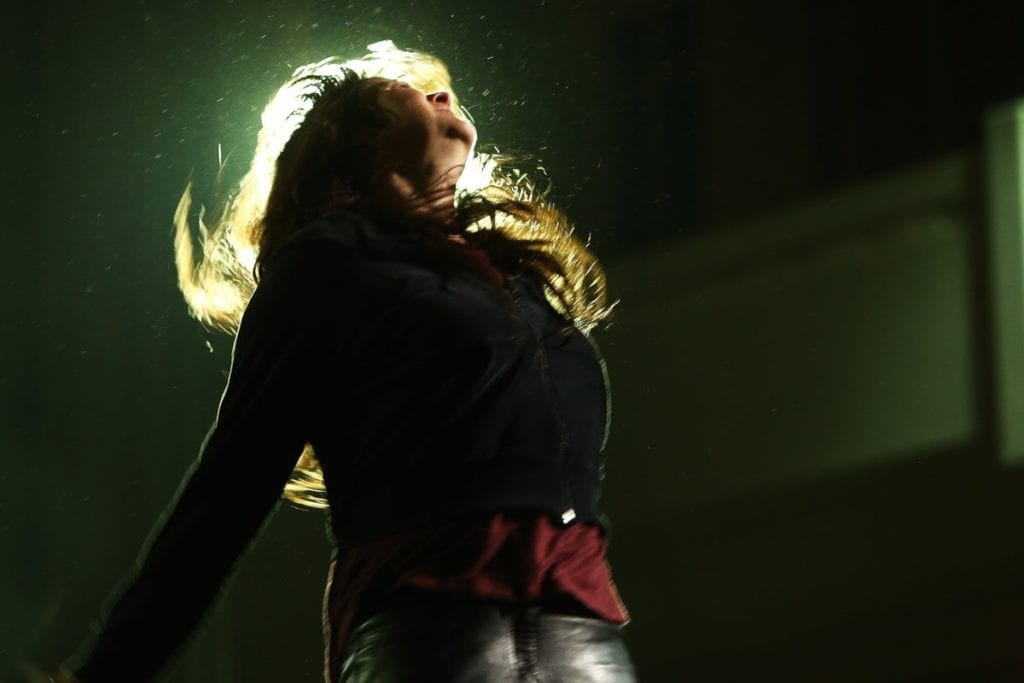
These movies screened at the Independent Film Festival Boston 2018, which ran from April 25—May 2.
NEVER GOIN’ BACK [2018], written and directed by Augustine Frizzell
The primary source of pleasure in Never Goin’ Back is its details. Writer/director Augustine Frizzell has lent her lovely, slight comedy—about two teenage girls in Texas having an amusingly awful time trying to make rent money—a precision of place and feeling that you rarely find in a movie so replete with gross-out humor. Everything is slick and hot, with the oppressive heat practically shimmering through the frame; the grass the girls walk on is dried and matted; the eyeliner and mascara applied at the beginning of the day smears off by sunset, indexed by black rings around the girls’ eyes the next morning. The apartments and houses they live in and find themselves in are appropriately banged up, the camera notes every stain on the couch, as well as the dull layer of dust and grime which coats the cheap patio furniture. It seems natural that two girls living in these conditions would spend their time dodging pervs, loser roommates, bosses, and assholes; they meet the resulting barrage of bullshit with complete and total irreverence, and their being in on the joke turns what could be utter misery into farce. And the film’s own jokes land, for the most part—though the body-humor finale seems derivative of the food poisoning sequence in Bridesmaids [2011]. It’s comedy that binds the two girls together—they’re often shot together in shallow focus, expanding the “us vs. the world” quality of their friendship into an aesthetic choice. Like the familiar pop music that scores the movie, there is nothing exactly new in Never Goin’ Back—but innovation is not always a virtue, and every anticipated beat is hit with a lightness of touch and a care that turns recognition into something equally illuminating. -Hannah Kinney-Kobre
Scheduled for theatrical release on August 3.

BEAST [2018], written and directed by Michael Pearce
Moll (Jessie Buckley), a 27-year-old who grew up being homeschooled after an altercation with a classmate involving a pair of scissors, still lives at home with her family—a helicopter-parent mother, and a father who has Alzheimer’s. She sings in her mother’s church choir, and holds a job as a historical tour guide in Jersey, an ostensibly-idyllic British island that’s haunted by its history. Clad in a dainty yellow dress at her own birthday party, Moll’s general sense of uneasiness is exacerbated when her more outgoing, peppy sister announces her pregnancy. Overshadowed and furious about it, Moll storms out of the house to a bar, and the wild night—by her standards, at least—leads to Pascal (Johnny Flynn), a local craftsman and outdoorsman who looks like he was raised in the wilderness (he spends his spare time sawing logs). Their attraction occurs instantly, with Moll as giddy as an elementary-school kid with a crush. But Pascal is accused of murder—and Flynn plays him with a menacing carefreeness, along with other qualities that remind you of the old cliche about the innate charisma of certain serial killers. Writer/director Michael Pearce avoids the good-girl-gone-bad cliches—Moll doesn’t go the rebellious route of Grease [1978] or Black Swan [2012]. The film shows us the character’s silent rebellions against her repression and her own darkness via more careful depictions—as in one scene where she crushes a cocktail glass in her hand, and neglects to fuss over the cuts. But her newfound freedom doesn’t come with a style change: Throughout the entire film, Moll dresses in unpretentious, practical-yet-feminine clothing with a palette of whites and blues, cut from airy cotton. Her birthday is the only time that she wears yellow—otherwise, her wardrobe complements the island scenery of blue waters, grey cliffs, and dark green forests. Pearce delves into Moll’s evolving feelings toward Pascal as she learns more about him from law enforcement, from her family, and from her own experiences. Through the tale of two loners navigating their relationship, the film explores the very concept of unleashing darkness—as Moll confronts her demons head-on. -Olivia Deng
Scheduled for theatrical release in Boston on May 18. Rated R.

DAMSEL [2018], written and directed by David and Nathan Zellner
Westerns so often brim with nostalgia for the airy plains marred with gunslingers and saloons with plenty of odd characters. Damsel conceptualizes from that very nostalgia, running with it like a scavenger on a hunting spree. Samuel Alabaster (Robert Pattinson) is the archetypal everyday western hero: a jovial and clean-cut man on a mission to rescue his apparently-kidnapped love Penelope (Mia Wasikowska). He plans to venture out into the wilderness to the little house where Penelope is being held captive, then save her, propose to her, and be married to her by way of Parson Henry (David Zellner). Of course, as these stories usually have it, nothing goes as planned; and Samuel quickly goes from good-natured, relatable hero to an utterly besotted man, towing along the nervous Parson on an unnecessarily long escapade (it recalls the traversing passages in the Lord of the Rings movies). Their journey is also absurd and arbitrary, with nods towards The Stranger; however, the absurdity quickly gives into annoyance, as the repeated images of one-dimensional characters stumbling across lush green forests and plains dappled in sunlight induce further ennui. When they finally reach Penelope, who is called “delicate” and a “peach” by the male characters, she proves that she is the least like a damsel (Parson, who is at a complete loss in the wilderness and unable to stand up for himself, is the character in most distress). Wasikowska plays poker-faced Penelope with a frightening ferocity and defiance; her performance is the high note of the film. She makes the most of the little material she was given to work with: grieving, and navigating away from her former home. But in the time it takes to arrive there, one can’t help but feel like the damsel themselves, helplessly subjected to whatever comes along as the film tries, and fails, to take the form of an avant-garde comedy-western. -Olivia Deng
Scheduled for theatrical release sometime this year.

HEAVEN WITHOUT PEOPLE [2017], written and directed by Lucien Bourjeily
Writer/director Lucien Bourjeily’s Heaven Without People is a tightly wound domestic drama that would work well for the stage or screen. The large table is set, and so is the scene: a tiny apartment, with room enough for several relatives, partners and children to pile in for an Easter meal. The first half hour of the movie gives you little indication of the volcanic tempers simmering below the surface of otherwise unremarkable dinner conversation and parlor games. The family’s matriarch putters back-and-forth from the kitchen with several dishes to serve, her Ethiopian maid pitching in right behind her. It’s a Christian holiday, but this family is in Lebanon, and disagreements about religion are practically guaranteed to bubble up among the adults. One of these inevitably-heated discussions turns into a full-blown shouting-match. Meanwhile: a theft from a mother’s purse. And that’s all it takes for true chaos to erupt—you wonder if we’ll even make it to dessert. Crammed into this claustrophobic living room, the characters quickly discard their fake pleasantries; and the film itself attempts to find some equivalent, with its handheld camerawork growing more jittery as talking devolves into yelling. There’s a recognizable quality to it all—enough to bring on sense memories of tense meals past. -Monica Castillo
For more information on this film, see heavenwithoutpeople.com.

NICO, 1988 [2018], written and directed by Susanna Nicchiarelli
One piece of dialogue sticks out in Susanna Nicchiarelli’s film about Christa Päffgen, a.k.a. Nico (Trine Dyrholm): “I’ve been at the top, I’ve been at the bottom. Both places are empty.” The film charts a later period in Päffgen’s life, more than two decades after The Velvet Underground & Nico [1967]—a period where she toured with a band of “junkie” musicians and used drugs constantly herself (all while indulging a constant barrage of radio interviews where the hosts only asked questions about the Velvet Underground). Dyrholm’s performance is a haunting one, characterizing Päffgen as a tortured soul whose past is catching up with her in every possible way. During Päffgen’s heroin binges, the film’s editing (by Stefano Cravero) punctuates the narrative with memories rendered via beat-up archival footage, suggesting fragments of a past that she can barely remember anymore. Like the footage itself, her recollections are distorted; memories after they’ve been mediated by a lifetime of alcoholism and drug use. But despite those internal demons, Nicchiarelli paints Päffgen as an uncompromising renegade, structuring her final year as one of musical passion, dream-chasing, and soulful introspection—right up until the bitter end. -Greg Vellante
Scheduled for theatrical release on Aug 1.
THE INDEPENDENT FILM FESTIVAL BOSTON 2018 CONCLUDED LAST WEEK. HOWEVER, THE ORGANIZATION DOES HOLD INDIVIDUAL SCREENINGS YEAR-ROUND—FOR MEMBERSHIP DETAILS AND OTHER INFORMATION, SEE IFFBOSTON.ORG.
Dig Staff means this article was a collaborative effort. Teamwork, as we like to call it.

